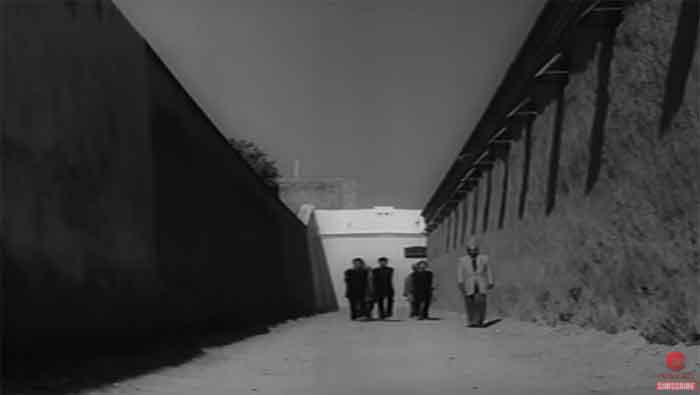
Great solidarity songs never die. There will always be more struggles where these will be hummed and sung to strengthen resolve and unity. This is certainly true of the five great songs from classic Hindi films we discuss here. Decades after these were created, these songs still continue to inspire.
Songs of solidarity often tend to be sung together and chorus increases the impact of these songs. The use of chorus greatly adds to the collective feeling inspired by the first two songs we discuss here. The first of these is from the film Char Dil Char Rahen (1959), a much appreciated film of K.A. Abbas. This song ‘ Sathi re, bhai re, kadam kadam se dil se dil mila rahe hain hum’ has been sung with great feeling by Mukesh, Mahendra Kapoor, Lata Mangeshkar and Meena Kappor, the last mentioned being a great singer who has been somewhat forgotten.The lyric is by Sahir Ludhianvi. Raj Kapoor, Shammi Kapoor, Meena Kumari and other stars are seen in the picturisation of this song.
This song sequence appears in the film when workers in solidarity get together to construct a path in difficult conditions. As they sing and work, the song urges them towards unity, weaves a vision of a world without exploitation and the distress this exploitation brings. The rhythm of this song, composed by the great musc director Anil Biswas, is maintained wonderfully at an inspirational level to match the moving words penned by Sahir.
The other, and somewhat similar, great solidarity song that no one will like to miss is Sathi hath badaana, ek akela thak jaaye to mil kar bojh uthana. This is from B.R.Chopra’s film Naya Daur (1957).In this song we see Dilip Kumar and Vyjanthimala with several villagers, all gathered for voluntary work to prepare a village path in record time. The song, again written by Sahir, is full of references to what unity and determination of people can achieve. Music composed by O.P. Nayyar, known for his extremely popular songs, has a wonderful sense of rhythm and goes very well with the spirit of the lyric and the film scene. This song has ben sung beautifully by Mohammad Rafi and Asha Bhonsale.
Both these songs have somewhat similar situations, scenes and ethos, but K.A.Abbas being the master of handling working class situations has been able to impart a more emotive impact and a sense of urgency to his song . The song moves at a fast pace powerful images of people at work, put together with great effect with slick editing. On the other hand B.R.Chopra tends to be more lyrical in his handling of Sathi Hath Badaana. There are more beautiful post-card views of workers and images of Dilip Kumar and Vyjanthimala together but the inspirational impact in terms of working together in challenging conditions is achieved more by Abbas.
The next three songs are from Shaheed (1965), the memorable film starring Manoj Kumar as Shahid Bhagat Singh which is regarded widely as the best Bhagat Singh film made yet. A great contribution to the film was made by Prem Dhawan who was the composer as well as the lyricist for the film. He has done a truly great job, whether in terms of music, writing new songs or handling old freedom struggle songs in a very effective way to enhance the impact of the film.
It is difficult to see these songs on the screen without eyes getting moistened. As a child when I saw this film many persons in the cinema hall were crying openly at the time of these song-sequences.
Songs of solidarity, like the two songs with which we started, often tend to be group songs which speak of unity with enthusiasm and optimism. On the other hand, these three songs from Shaheed depict very sad situations of great sacrifices through which they convey a strong sense of solidarity with freedom fighters.
Ae watan , ae watan hamko teri kasam is a song sung by Bhagat Singh in the film in a very determined voice at a time when his hand palm is being burnt by a candle. This song has been sung by that immortal singer Mohammed Rafi in a voice that conveys great courage and determination but is still restrained.
The second song Sarfarorshi ki tamanna ab hamare dil me hai was written by the great freedom fighter Ram Prasad Bismil during the freedom movement and Prem Dhawan has used this with great effect at the time when Shahid Jatindra Nath Das dies in jail after a very long fast. This song has been sung in a very restrained yet soulful way by Rafi Sahib, Manna Dey and Rajendra Mehta.
The third song Rang De Basanti Chola is again a very popular song of the freedom movement and is still widely sung when the spirit of great courage and willingness to sacrifice happily for a great cause is to be evoked. This song has been used in a very memorable way in the film for the last sequence when Bhagat Singh, Sukhdev and Rajguru are hanged. This song, which is punctuated by slogans at several places, has been sung by Mukesh, Rafi, Rajendra Mehta and Lata Mangeshkar.
These songs of solidarity will always be there on the lips of people whenever there are struggles against exploitation and imperialism and in gatherings for asserting and protecting the rights of people.
Madhu and Bharat Dogra work together on the subject of socially relevant and memorable songs.
Related posts:
Views: 0
 RSS Feed
RSS Feed

















 November 14th, 2021
November 14th, 2021  Awake Goy
Awake Goy  Posted in
Posted in  Tags:
Tags: 
















